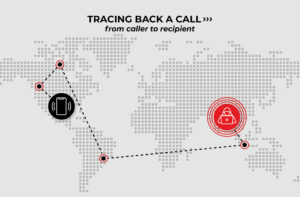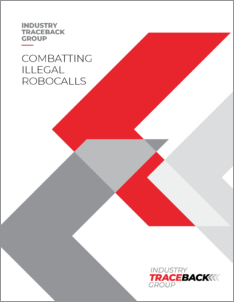For Providers

The Industry Traceback Group, or ITG, conducts tracebacks of suspected illegal calls on behalf of the communications industry, relying on the cooperation and collaboration of thousands of voice service providers in traceback requests. The ITG operates pursuant to established Policies and Procedures and, in the United States, serves as the official U.S. Traceback Consortium designated by the FCC.
In late 2020, the FCC formally endorsed a mandatory traceback requirement for U.S.-based providers, stating in December that all “voice service providers are now legally required to respond to traceback requests” from the ITG. The FCC also has indicated that “contractual provisions that prohibit, delay, or otherwise interfere with a voice service provider’s cooperation with private-led traceback efforts are contrary to the spirit and goals” of the federal TRACED Act.
Using a secure traceback portal developed by the ITG, suspected illegal calls are traced systematically back through various networks until the ITG identifies the originator of the suspicious calls, where the calls entered the country if internationally originated, and often the identity of the calling party. The ITG traces the call back from the recipient to the caller – usually routing through 4 or more, or sometimes as many as 9 or 10 service providers (or “hops”) across the globe. As a call is being traced, the ITG’s semi-automated system contacts each services provider in the path of the call.
Providers do not need to proactively register with the ITG to cooperate with traceback requests and thus meet any applicable legal obligation. Rather, providers simply need to cooperate with traceback requests they receive from the ITG, which they only will receive when a suspected illegal call transits that provider’s network. If the provider has not previously received a traceback request, the ITG will rely on contact information it acquires from various sources, including the provider’s downstream partner as well as the FCC’s Robocall Mitigation Database for U.S.-based tracebacks to send the traceback request, after which the provider can register additional emails to receive the requests.

For U.S.-based tracebacks, the ITG operates under the auspices of the Communications Act which permit providers to disclose and/or permit access to call detail records and other customer proprietary network information certain circumstances. Most notably, section 222(d)(2) of the Communications Act permits providers to share such information in order to protect the rights or property of the provider, or to protect users of telecommunications services and other providers from fraudulent, abusive, or unlawful use of, or subscription to, those services. The FCC has made clear that sharing information as part of traceback requests do not violate the privacy obligations under the Communications Act and the agency’s rules.
Every Provider Has a Responsibility to Help Stop Illegal Calls
Traceback is just one mechanism to stop illegal calls, including illegal robocalls. Indeed, merely responding to tracebacks, without taking reasonable steps to eliminate the origination of illegal calls after notification of them, is not sufficient. Nor is merely cooperating with tracebacks consistent with emerging regulatory and industry expectations for voice service providers.
If you would like to learn more about the traceback process and cooperating with the ITG, please visit our contact page to learn more. The ITG also maintains a Do Not Originate (DNO) Registry. To learn more about the ITG’s DNO Registry, please visit here.
Supporting the ITG
The ITG relies on the support and collaboration of leading companies from across the wireline, wireless, VoIP, and cable industries, while many more providers cooperate with the ITG on a daily basis.
If you are interested in supporting the ITG, please review the ITG’s Policies and Procedures for more information and click New Member Inquiry below to make an inquiry. If instead you want to learn more about the traceback process and cooperating with the ITG, please complete an inquiry form.
Please note: Providers do not need to, and should not, proactively register with the ITG to cooperate with traceback requests or to otherwise meet any legal obligation. Providers do not need to be members of the ITG to cooperate fully with traceback requests.

